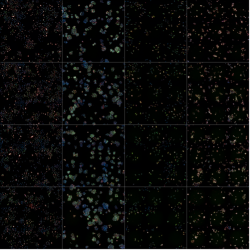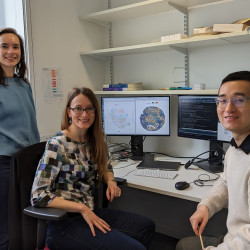By Sofia Velazquez Pimentel
Researchers have pioneered a new method for profiling treatment-resistant ‘sleeping’ cancer cells. Teams across the MRC LMS, University College London, the University of Oxford, and the University of Birmingham successfully developed a method to detect ‘sleeping’ cells in tumours based on gene activity signals. Using a combination of machine learning and experimental approaches they discovered new genomic modulators that influence whether a cancer cell will respond to treatment. The teams’ discoveries hold potential for tackling even the most resistant forms of cancer in the future, offering hope for patients and healthcare professionals alike.
Therapy resistance in cancer remains a significant obstacle for both researchers and patients. This resistance, relapse and the spread of cancer phenomenon primarily arises from a small subset of cells. When exposed to treatment, these cells halt their division and enter a ‘sleeping’ state in the form of G0 cell cycle arrest. Remarkably, these cells can remain ‘asleep’ for years or even decades, only to ‘awaken’ later, leading to a recurrence of cancer. Gaining a comprehensive understanding of these treatment-resistant ‘sleeping’ cells is crucial to develop targeted strategies that can effectively combat even the most resilient forms of cancer.
Identifying the elusive ‘sleeping’ cells has been a long-standing challenge in cancer research, as they are not easily measurable within tumours. This had been a barrier in the systemic understanding of the process and genetic interactions that lead to ‘sleeping’ cells across cancer types.
In the latest research by MRC LMS, UCL, the University of Oxford and the University of Birmingham, published in Genome Biology, researchers developed a way to precisely characterise the ‘sleeping’ cell state using a combination of machine learning and experimental approaches. Researchers hope that this brand-new method will catapult future treatment development that can target these cells directly.

Representative images of thousands of Non-Small Cell Lung Cancer cells were used to help train and test the new machine learning approach to accurately identify sleeping cell states.
The researchers developed a brand-new method that overcomes the difficulties in detecting ‘sleeping’ cells that is based on their genetic profiles to profile the ‘sleeping’ cells’ signals in a range of treatment-resistant cancers found in the lung, breast, and liver. Lead researcher, Dr Maria Secrier, whose team brought computational expertise from the UCL Genetics Institute elaborated ‘Our new method will enable scientists to further study these cells and develop new biomarkers that could be used to monitor cancer progression and therapy response, and potentially develop new drugs that could effectively eradicate these cells.’

Dr Maria Secrier, lead researcher of this new publication, and her team at the UCL Genetics Institute used their computational expertise to develop the new methodology.
Researchers used machine learning that integrated hundreds of known drivers of tumour formation to assess which genes hold an influence on whether a fast-dividing cancer cell becomes a ‘sleeping’ cell. This analysis identified new genomic modulators of this process that could determine whether the cells will respond to therapy.
Through collaboration with the Cell Cycle Control team at the MRC LMS, led by Dr Alexis Barr, these genomic modulators could then be tested in experiments to see if perturbing their levels could push cells into or out of a sleeping state. For example, they found that blocking the genetic modulator CEP89 increases the tendency for cancer cells to enter a sleeping state and could be a potential new target for cancer treatment. Dr Alexis Barr added ‘Identifying novel modulators of these sleeping cancer cells is very exciting. It opens up the possibility to identify, track and, hopefully, eliminate these long-term sleeping cells that remain under the radar in patients. The next steps will be to try and find out what these different genomic modulators are doing so we can work out how to manipulate them to the advantage of patients’.

Experimental work on this new method was led by the MRC LMS Cell Cycle Control team, led by Dr Alexis Barr.
The researchers’ discoveries are a significant step forward in understanding the ‘sleeping’ cells in tumours. These findings offer hope for the development of new biomarkers to monitor cancer progression and therapy response, as well as new drugs that can effectively eradicate these cells. As a result of this research, a number of currently untreatable forms of cancer could be treated in the future, making it an important step forward in cancer research.
This research ‘Genomic hallmarks and therapeutic implications of G0 cell cycle arrest in cancer‘ published in Genome Biology, was done by the MRC LMS Cell Cycle group in collaboration with University College London (UCL), Imperial College, University of Birmingham and the University of Oxford and was published in Genome Biology.
This research was mainly funded by UKRI, the Medical Research Council, Academy of Medical Science, Wellcome Trust and Cancer Research UK.
